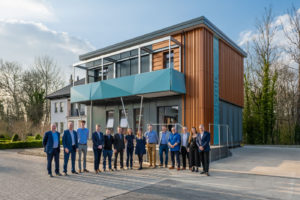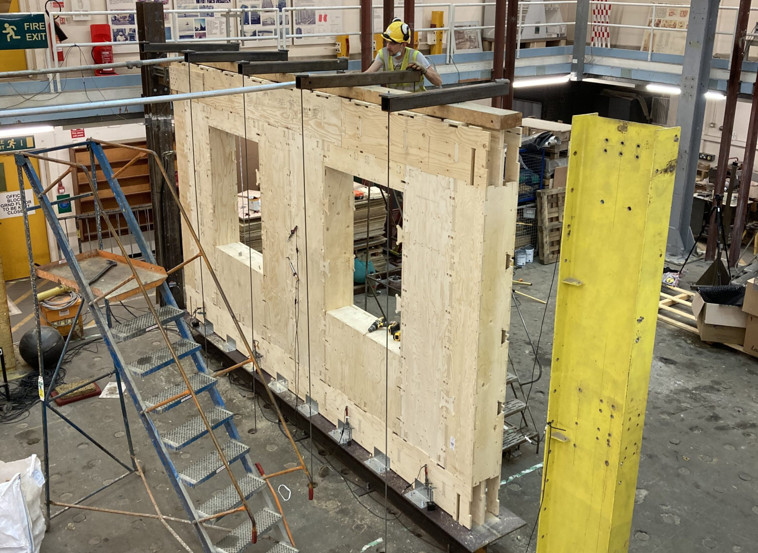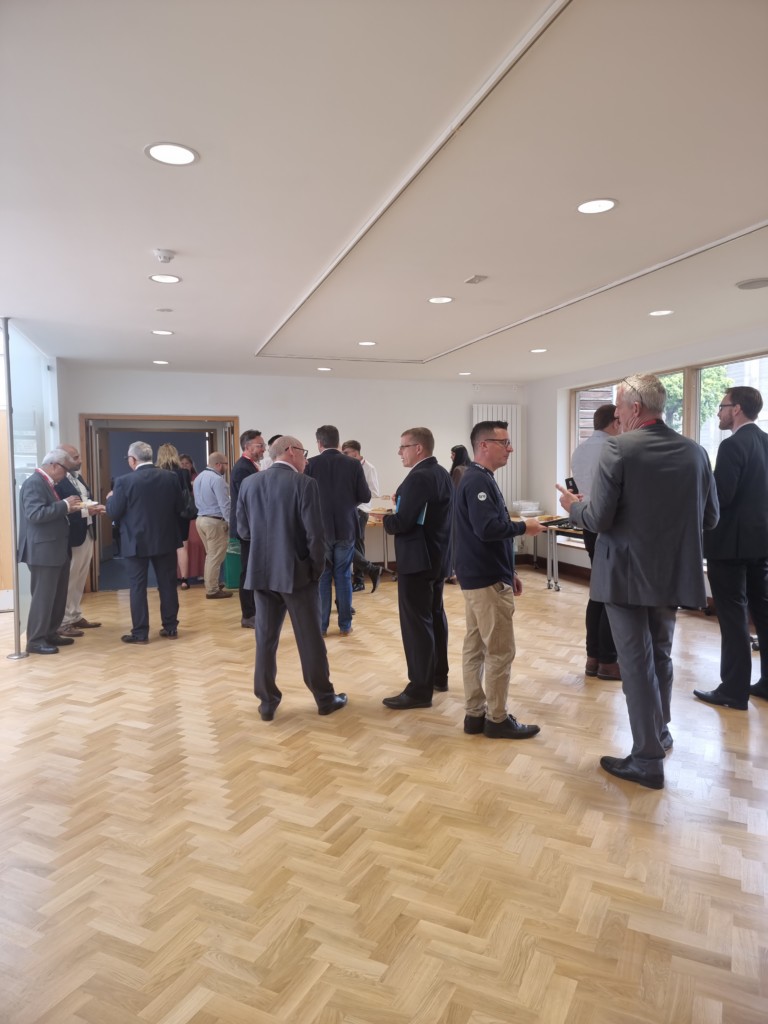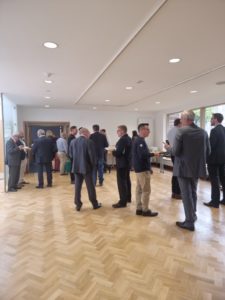At our Members Day at the BRE Science Park we set out to allow members to create connections, inspire change, demonstrate the art of the possible and get people thinking about practical implementation. That is certainly what we did!
Creating connections
Constructing Excellence is all about bringing together diverse ranges of opinions and views to create greater understanding and connections that will help us all tackle the big issues that face our industry. Set against a backdrop of physical examples of innovation that prove that MMC, digitalisation and net zero can be technically delivered we need to focus as an industry on how we implement these solutions at scale.
Participants were enthused by the opportunity to see things in real life and hear others’ views. There will never be a magic bullet, but we collectively need to get over our own inertia and start tackling these long-term issues. We hope this opportunity has stimulated new ideas for our members and help them to implement new approaches and innovations in the future.
Underpinned by research
Eloise Francis Innovation Director at BRE who has recently joined the Constructing Excellence Board described how BRE is delivering research and innovation to support the industry, translating research and science into usable tools to drive change. There are lots of opportunities for CE members to get involved in research and innovation activities including around Robotics, 5G and hydrogen decarbonisation.
James Duncan Head of Construction and Environment at BRE and his team provided a glimpse inside some of the research laboratories including the Structures Lab and the Burn Hall. The testing and research taking place across the Science Park is helping the industry de-risk innovation based on robust technical performance testing. Sound technical performance data is a fundamental piece of the jigsaw to allow us to implement Net Zero, MMC and other much-needed transformation.

Demonstrating the art of the possible
Constructing Excellence aims to inspire through demonstrating the art of the possible. The innovation buildings at the Science Park each provided a different story of how we can embrace better delivery systems.
- The Collida approach from Willmott Dixon is a test bed of a systematic approach from a major contractor to embracing MMC and digitalisation to deliver higher quality, net zero homes. This is an industry-leading approach bringing together supply chain partners in a systems approach to delivering better outcomes.
- The Seismic building how the Seismic open product platform enables contracting authorities to collaborate and find opportunities that enable interoperability of components across different sectors.
- More Housing is aimed at using a high-quality modular approach to solve theproblems of homelessness. Delegates were impressed by the potential application for quality, demountable and reconfigurable units for temporary works.
- Project Etopia demonstrates how a panelised system using advanced manufacturing techniques deliver a high quality, comfortable and energy efficient home.

Innovation to Implementation
Having been inspired by the transformational potential of innovation we looked at how to move to move to widespread implementation and commercialisation.
Procurement
Procurement is key to enabling innovation and change in projects and that is why it is such a big focus for us at Constructing Excellence. As we sit in an environment where price volatility is magnifying risk, solid and fair procurement practices are going to be critical.
- Short-term thinking is seen as a huge barrier to effective procurement. Government operates on a 4/5-year electoral cycle and a 3-year spending review cycle. Given the strategic nature of construction and its role in underpinning the economy and society, much of the strategic social and economic infrastructure investment is undeliverable with current approaches. The Construction Playbook helps address this and its approaches and recommendations need to be fully embraced.
- Strategic Procurement Skills are often lacking. For innovation and MMC to work effectively procurers need to fully understand what is being procured to prevent the risk of procurement limiting the potential for innovation or new ways of working to be effectively implemented. Particularly around MMC procurers need to understand the business model of the supply chain in order to support and nurture the supply chain and indeed support standardisation. There is an education piece required, particularly around government procurers.
- Collaborating with manufacturers – unlocking innovation requires different supply chain relationships. Manufacturers and specialists need to be brought to the table earlier. MMC requires different contractual arrangements that balance long-lasting relationships with competitive requirements, finding effective ways to balance governance and relationships. There needs to be a recognition that innovation requires long-term thinking and an acceptance that solutions will evolve requiring investment to bring through to widespread implementation. It won’t work first time and at the correct price point.
- Pipeline – Investment in innovation and particularly capital-intensive MMC f
 acilities requires a robust pipeline that can be used to unlock finance and create market certainty.
acilities requires a robust pipeline that can be used to unlock finance and create market certainty. - Decision makers – Innovators, particularly from outside of construction can struggle to find the right route to market for their product, with much time and effort spent talking to someone who isn’t empowered to make the final purchasing decision. Construction should look to have clearer pathways for innovators to engage and innovators should make a greater effort to understand the process. There needs to be an understanding of both the supply side and the demand side.
- Standardisation – need to consider how better procurement can accelerate standardisation – currently a lack of standardisation holds back the long-term value of MMC.
- Funding – Participants were concerned about the impact of BCIS data on calculations relating to MMC. The savings are not passed on to the funder if the project is manufactured in an area where the BCIS rating is lower.
- Intellectual Property – Innovators and supply chain partners need to come up with solutions around Intellectual Property. There is a careful balance between protecting IP and exploiting IP. Standardisation, collaboration, sub-assemblies can bring tremendous commercial advantage, but IP needs to be considered. Although IP is only valuable if it can be commercially exploited.
Collaboration
- Culture – Collaboration is a fundamental principle of Constructing Excellence. However, we cannot have effective collaboration without the right culture in place to support it.
- Common objective – Collaboration requires all parties to align around common objectives. The needs and requirements may differ, however there needs to be alignment around the objectives. Clarity around objectives will help with the inevitable difficult conversations.
- Communication – construction is a fragmented industry and we need to communicate better across organisational and functional siloes.
MMC
- Unlocking the market – There needs to be a change in perception around risk and cost associated with moving away from traditional approaches. The upfront investment cost for manufacturers is difficult to bear if there are no proven markets and robust pipelines to respond to. Standards in modular production are required to deliver consistency and quality and prevent over-design, which in turn will create market confidence. A full-scale process change is required, challenging current supply chain hierarchies and go-to-market strategies.

- Data – standardisation and systems approaches will unlock product information management. Currently data management has to be built from unique product data. Equally performance data is required.
- Skills – MMC and digitalisation requires a significant shift in professional and operative skills. Retraining is required.
Net Zero
- Standards and industry education were again seen as important in the shift to Net Zero. There is currently a lack of understanding that makes action difficult. This applies to the whole industry to prevent the risk of a paywall to delivering Net Zero.
- While policy, regulation and procurement can be used by government to drive sustainability, private sector behaviours are being positively impacted by the ESG agenda and the move towards green finance. Major projects and clients can use their significant purchasing power to drive the market. These are global challenges with countries across the globe dealing with energy decarbonisation and supply chain decarbonisation.
- Robust data and standards are required to support the effective delivery of net zero including around carbon offsetting, scope 3 emissions and carbon offsetting.
- Buy in and education of client advisors is critical to moving forward the net zero and sustainability agendas and this requires leadership from clients and policymakers.




Comments are closed.